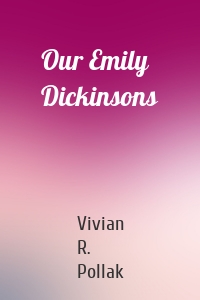Vivian R. Pollak
1 кн.
Our Emily Dickinsons
For Vivian R. Pollak, Emily Dickinson's work is an extended meditation on the risks of social, psychological, and aesthetic difference that would be taken up by the generations of women poets who followed her. She situates Dickinson's originality in relation to her nineteenth-century audiences, including poet, novelist, and Indian rights activist Helen Hunt Jackson and her controversial first editor, Mabel Loomis Todd, and traces the emergence of competing versions of a brilliant but...
| Автор | Vivian R. Pollak |


